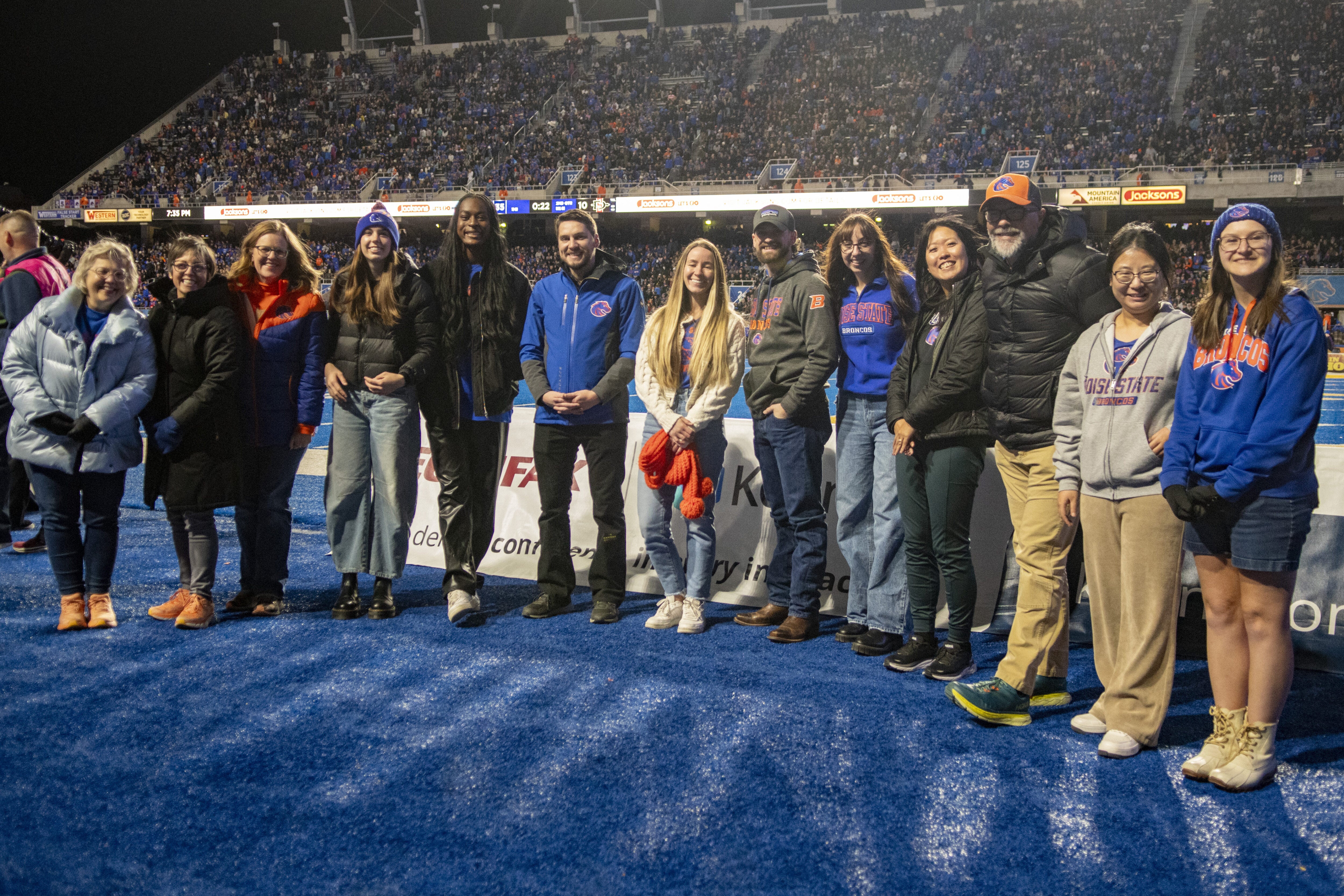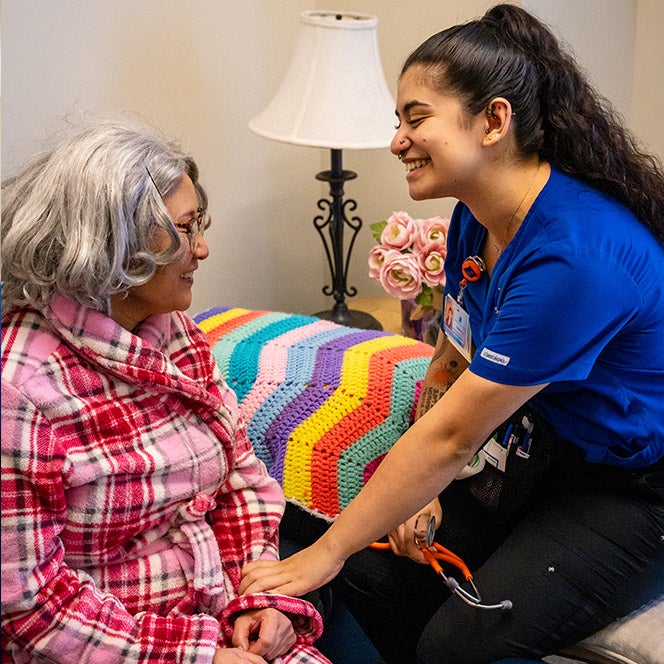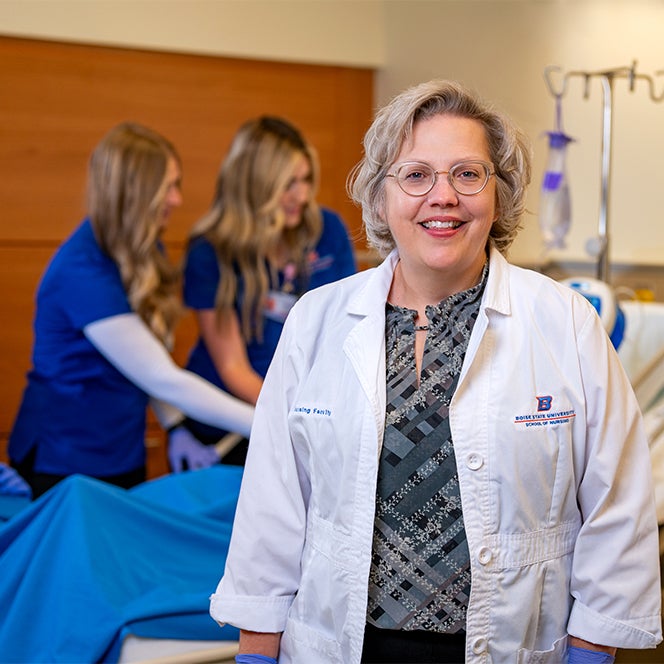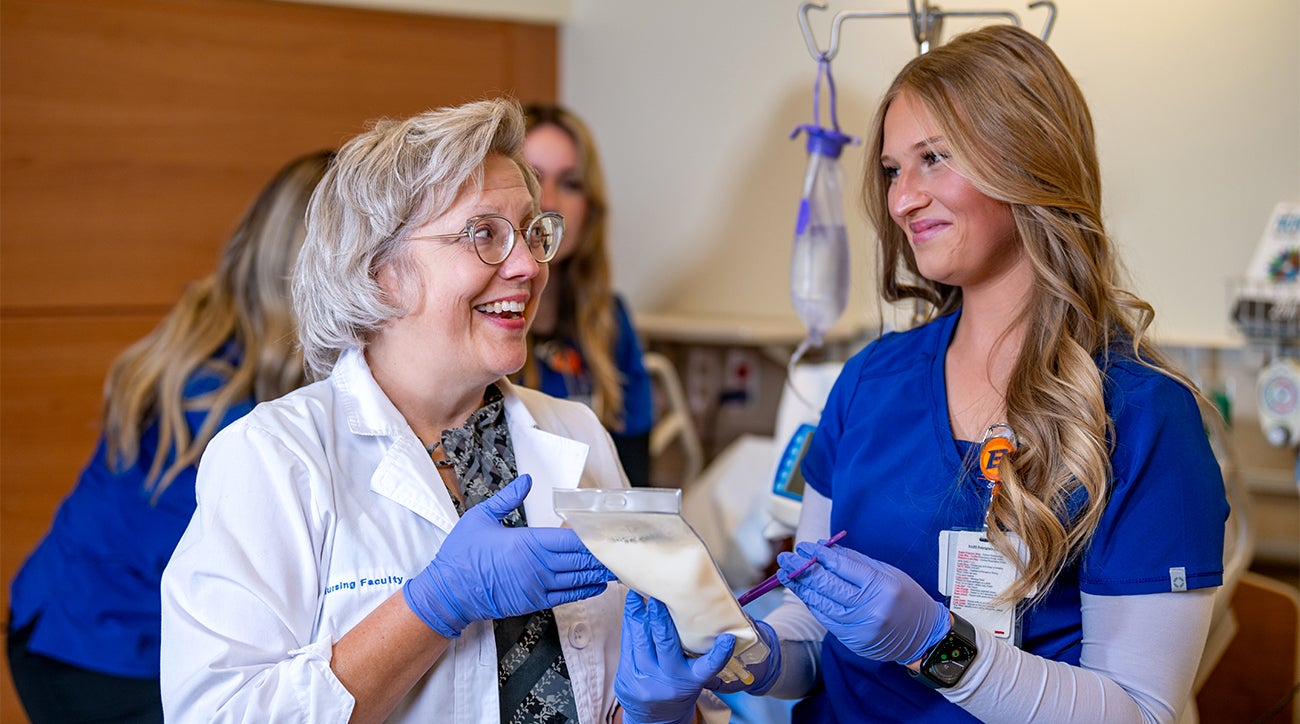
Nursing faculty and undergraduate research assistants were honored as the Nov. 1 football game’s “Blue Turf Thinkers,” a series highlighting innovative academic programs during every home game.
The School of Nursing’s faculty leads the field in nursing education, simulation and clinical training. Their patient-centered scholarship transforms lives across the Treasure Valley, thanks in part to a passionate group of student nurses.
“We currently have 17 undergraduate research assistants in the School of Nursing, which is almost 5% of our pre-license students,” said Amy Spurlock, professor and Jody DeMeyer Endowed Chair in Nursing. “We could not accomplish the volume or quality of work without their input.”
While Boise State nurses are well-prepared to impact the community upon graduation, they’re making a difference even now as students.
“Research is immensely rewarding because it spans so far beyond one person’s reach,” said Amber Baranek, a research assistant. “Research can be in its infancy and lay the groundwork for future practice, or it can build on established evidence to improve upon any aspect of practice we see fit. Research is for all of us because research impacts all of us.”
Research focused on patients and their families
Nursing scholarship “collectively comes back to addressing needs in communities,” Spurlock said, whether that community is made up of patients, families, students or a larger population.
Matthew Bailey, a research assistant graduating this fall, now has a better understanding of patient-centered care because of his research.

“The role of a bedside nurse that we learn in school is primarily focused on safely providing care, which is important, but I gained a better understanding of the patient experience before and after an in-patient stay,” he said. “This encompasses a bulk of a patient’s experience, and improving or acknowledging these aspects of their lives can make a big difference in their overall health. I gained more appreciation for the role of a researcher to add a small piece of information to the larger knowledge base around health, wellness and nursing best practices.”
Bailey works with Associate Professor Cara Gallegos on projects related to stress and anxiety for parents of children with complex medical conditions. For him, patient-centered care looks like caring for the patients’ caregivers.
“Parents typically take on a large amount of caregiving to their children and parents that are consistently stressed or anxious can provide worse care which negatively impacts the health of the child,” Bailey said.
He hopes their research will “increase the resources available for parents and families.”
Trailblazing scholarship impacts patients and students
“Nurses provide person-centered care, which must be individualized, compassionate and evidence-based,” Spurlock said. “Keeping the perspectives of patients in mind is imperative in order to positively impact outcomes.”
Her research team investigates using blended whole foods for patients who need a liquid diet through feeding tubes. Thanks to her work, patients can experience positive outcomes like growth, weight gain and relief from negative tube-feeding symptoms, like nausea.

While blending whole foods sounds relatively simple, Spurlock’s work is mildly controversial. Her positive results contradict decades of best practices that restrict feeding tubes to commercial food blends.
Some researchers might be intimidated by the idea of taking unconventional approaches, but Spurlock isn’t. Having lost her stepdaughter to feeding tube complications, Spurlock is driven to find evidence that best supports positive outcomes for every patient, whether or not it’s a little out-of-the-box.
“One of the most important things I have learned through research is that there is so much that we, as healthcare professionals, don’t know and standards of care are changing all the time,” said Sharece Mecham, a senior nursing student working with Spurlock on this project. “It is crucial to collaborate with patients, the community and other healthcare professionals to do what is best for the patient/community with the knowledge that we do have. We need to always seek out more knowledge and better practice.”
Baranek has also noticed the importance of being adaptable and willing to try new things in patient-centered care and research.
“Research is much more malleable than I thought it was, just like patient-centered care is. In both cases, these things will not look the same for everyone,” she said. “Both patient-centered care and research require our utmost flexibility because we can never rely on circumstances to remain set in stone.”
Why become a research assistant?
“I have had multiple friends ask me this same question and my answer is that we can not have evidence-based practice in nursing without evidence,” said Baranek.
“It is our responsibility as healthcare professionals to know the most up-to-date information regarding our field because it leads to the best quality care for our patients. By participating in research, I am hopeful that I can contribute to these steps forward and inform future nursing practice so we can provide all patients with the equitable and informed care they deserve.”
Both students and faculty find the research experience together invaluable. Here’s why.
Top-tier nursing education
Idaho needs strong, compassionate nurses to meet today’s healthcare demands, and Boise State’s School of Nursing delivers.
Dedicated to excellence, U.S. News and World Report ranked Boise State’s online graduate nursing program 10th in the nation and the #1 bachelor’s in nursing program in Idaho since 2023.
“This ranking reflects both the innovation and expertise of our faculty as well as the outstanding caliber of our students,” Spurlock said.

The bachelor’s in nursing program is continually in demand, often receiving over 200 applications each semester for an 80-person cohort. The program recently updated its curriculum to reflect new industry standards and ensure students get the most relevant education to equip them for the modern workplace.
Students receive holistic training through a scaffolded learning approach. They build competence not just in basic nursing skills, but in healthcare technology and informatics, design thinking and innovative change. They also practice communication, teamwork and repetitive skill-building in the state-of-the-art College of Health Sciences Simulation Center.